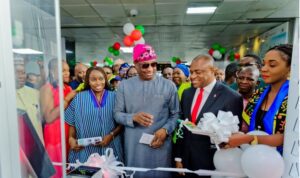Analysts predict inflation rate creeping back to 18.1% in June
By Kayode Tokede
Analysts at Financial Derivates Limited (FDC) have predicted that headline inflation for June will likely creep back up to 18.1per cent, a level last seen in March 2021, stressing that the month under review could represent a point of inflection on the trend line of declining inflation which started in April 2021.
FDC in its latest report stated that analysts are skeptical and questioned the basis for a decline in the rate of inflation at a time when global food prices and other causative factors of inflation were moving in the opposite direction.
The National Bureau of Statistics (NBS) had said headline inflation dropped to 18.12 per cent in April, 0.05 per cent lower than 18.17 per cent recorded in March 2021.
However, the Lagos-based firm in its report stated that, “One of the key catalysts of price inflation in Nigeria has been the pass-through effect of exchange rate adjustments on domestic prices.
“One reason why there has been a delayed impact of the recent depreciation of the naira on the domestic price level is the outside lag effect. It was only on May 24, 2021, that the CBN moved the exchange rate.
“Therefore, the impact will only be felt in June and July. Other causative factors include higher logistics costs, insecurity, and planting season effect.
“The FDC survey is Lagos-specific and much narrower sample size than the NBS nationwide survey. Statistically, narrow sample size may not be reflective of the entire market. However, since Lagos is believed to contribute about 40% of Nigeria’s GDP and transactions, the weight of Lagos in a national survey cannot be underestimated.
“This is validated by Lagos ranking of 18 out of 36 states of the federation in May, making it to be the median. Kogi State and Bauchi state had the highest rate of inflation in May. That being the case, there is a high probability that the outcome of a Lagos survey is more likely to influence the national empirical findings.
“Based on our market survey, commodities prices have remained stubbornly high. The average price of food commodities jumped by 93per cent from Jun ’20 – Jun ’21 while it increased by an average of 28per cent from Jun ’19 – Jun ’20.
“Food inflation is projected to rise to 23.4% in June after falling for two consecutive months. Rising commodity prices are being amplified by the impact of seasonality and rising global commodity prices.
“The impact of delayed rainfalls and seasonality also came to play as we saw food prices surged in June. Seasonality could have been responsible for a spike in the prices of some agricultural commodities such as tomatoes, pepper, onions, etc. The relative price inelasticity of these commodities (no close substitute) has made the demand remain unchanged.
“When imported commodity prices rise and become unaffordable the switch in demand of local substitutes leads to higher prices (cross elasticity of demand). Imported commodities increase as the global food index climbed to a record high of 124.6 points in June.
“The question on the lips of analysts is likely to be “Why this reversal of the trend? Whilst some analysts expressed skepticism as to the sustainability of the trend, our understanding of the change in direction is because the base year effects of 2020 have since waned and that a new impetus of price momentum is at play again.
“For example, it was only on May 24th that the CBN moved on the exchange rate adjustment from N379/$to N411/$ at the IE window. In the parallel market, the Naira fell by 3.9% to N505/$ because there was not a corresponding increase in forex supply to the market. The impact of the currency pass-through to domestic prices only began in June and July.
“In addition, the price of diesel, the principal fuel for logistics and distribution spiked 23.95 per cent to N295 per liter. These factors were mainly responsible for pushing both food and other prices against the expected direction.
“Despite the weak aggregate demand, month-on-month inflation is estimated to increase at a faster pace to 1.36per cent (17.61per cent annualized) in June from 1.01per cent (12.82per cent annualized) in May. This is because manufacturers continue to pass on the increase in production costs to consumers.
“If the NBS announces an increase in inflation, investors and the market would not be surprised and will take it in stride.
“This is because the markets were just as surprised as analysts when inflation supposedly moderated. The stock market which technically has an inverse relationship with interest rates has already lost 2.04% since June. This is because investors have already priced in an increase in the general level of interest rates. The real estate market where vacancy factors are on the increase is not any different.”




